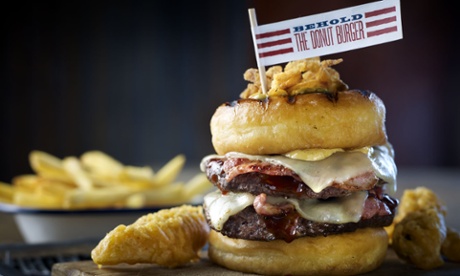
With the recent outrage over Hungry Horse’s decision to put a doughnut burger on its menu, you might think that the UK pub chain is the first to commit such a crime against gastronomy. But it’s not.
The Burger Bistro, Lokal Miami, Cypress Bar and Leeds-based Red’s True BBQ are all guilty of the same. And the daddy of them all is probably Chicken Charlie’s with its Krispy Kreme Triple Cheeseburger.
Doughnut burgers are unhealthy and loaded with calories (to be precise, there are 1,996 in Hungry Horse’s), and nutrition experts are keen to make us aware of this fact. But as with most junk food, the jury is out on how they taste and they’ll probably make you feel grubby afterwards, yet they’re immensely popular. Red’s True BBQ claim it shifted 14,000 of them in the six months after it went on its menu.
Why is it that Hungry Horse has been singled out for criticism then?
“Hungry Horse markets itself as offering ‘great family value’. But is value just about quantity, or is it not about quality too?” says Mark Linehan, managing director of the Sustainable Restaurant Association. “Concepts like Meat Free Monday have resonated with a significant section of the [public], as has the idea of eating less but higher quality meat ... However, some sections of the budget end of the market persist in treating meat as a cheap commodity to be consumed in large volumes.”
The doughnut burger is one example in a calorific trend that is seeing patties grilled and sold with no remorse. It’s rumoured that both McDonald’s and Burger King have secret menu options. The former is said to offer the McGangBang Mac, a McChicken sandwich stuffed inside a double cheeseburger, and the latter the Suicide Burger, a cheeseburger consisting of four patties, bacon and sauce.
It’s not just fast food chains that are fuelling a culture of over-consumption; independent restaurants and pubs are at it too. For instance, some present dishes in bin lids – a possible reference to people being human dustbins – and others run Man v Food-style competitions.
A pub in Cardiff that offers an eating challenge involving a stack of several patties, was contacted for comment. Its owners requested anonymity, indicating that they “are a respectable establishment” that doesn’t want to be associated with “purveyors of greasy, unhealthy food”.
The owners said:
All our meat is locally sourced. The eating contest we run is purely for fun, and hardly any food is wasted because only those who are confident of completing it attempt it. Plus, our burgers — served in a sesame bap and with our secret recipe sauce — are so delicious, you’d be silly to waste any of them anyway.
Sourcing meat from a local farmer, dressing it up in an organic bun with gourmet sauce, isn’t necessarily an indication of a sustainable business that promotes healthy food. There’s a concern that restaurants and pubs offering eating challenges contribute more to the food waste problem. According to the UK government’s waste adviser WRAP, the hospitality sector is responsible for more than 1.3bn wasted meals a year, the equivalent of one in six meals it serves.
Negligent attitudes towards meat consumption and food waste are rubbing off on diners, who are often unaware that eating something you don’t really need is still a waste of food. Ben Luong is the founder of a website dedicated to eating challenges across the UK.
Does he feel guilty if he ever leaves food on his plate?
Never. If I don’t complete a challenge I feel the pain and disappointment more ... I would if there was a food shortage but there is currently enough food around to feed everyone. What I eat or don’t eat makes no difference to the global food problems. Now, say if I were taking burgers off the plate of someone that needed food, to do my challenges, and I wasted some, then that would be different.
Luong believes that restaurants and pubs would still run eating challenges even if they were sourcing the best quality meat and dairy products. Linehan isn’t so sure. He suggests that those switching to better quality and more expensive produce — be it free-range eggs or Freedom Food pork — are the ones concerned about the amount of food being wasted, and where you’re less likely to find the likes of doughnut burgers and eating challenges on the menu.
“There is a cost associated with this switch... but restaurants that have addressed their food waste, miraculously find they have more money to [offer] better quality food,” he explains.
Read more like this:
- Are seaweed snacks the future as the tide turns on meat consumption
- From vegan beef to fishless filets: meat substitutes are on the rise
- Brought to you by: The CEO of Bord Bia on Ireland’s journey towards a sustainable food system
The food hub is funded by The Irish Food Board. All content is editorially independent except for pieces labelled ‘brought to you by’. Find out more here.
Join the community of sustainability professionals and experts. Become a GSB member to get more stories like this direct to your inbox

